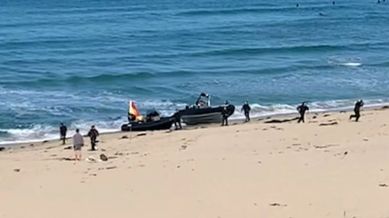Stay updated with the latest - Click here to follow us on Instagram
Fishermen, BMWs and ‘motherships’: High-speed sea chase leads to £18 mn cocaine seizure in Cornwall
The case began when a Border Force cutter, HMC Valiant, spotted a rigid-hulled inflatable boat (RHIB) acting suspiciously near Cornwall.

A dramatic sea chase off the coast of Cornwall last September led to the seizure of £18 million worth of cocaine and the arrest of seven men connected to an international drug smuggling network.
The operation, named Libellary, shone a light on a method used by South American and British gangs to bring drugs into the UK using “mother ships” that drop off cocaine bales at sea. These are then collected by smaller boats and brought to shore, often at remote coastal spots.
monthly limit of free stories.
with an Express account.
The case began when a Border Force cutter, HMC Valiant, spotted a rigid-hulled inflatable boat (RHIB) floating suspiciously near Cornwall. Officers gave chase as the boat sped away. For 28 miles, the RHIB attempted to outrun the Border Force, dumping bales of cocaine overboard during the pursuit.
The chase ended at Gwynver beach, near Land’s End. Three men tried to flee into the sand dunes but were caught. Officials recovered six out of 11 cocaine bales, worth around £18 million.
National Crime Agency (NCA) officers later identified the three men as Peter Williams, 44, Scott Johnston, 38, and Edwin Yahir Tabora Baca, 33. They also found a Garmin chart plotter and knives in the boat.
Barry Vinall, the NCA’s senior investigating officer, told The Guardian: “You’ve got organisers, logistics, security, customers.”
One of those arrested, Peter Williams, was a fisherman from Hampshire. He ran a small fish business called Fresh from the Boat, but financial pressure had built up after his boat was destroyed in Storm Eunice in 2022. A new boat was funded partly through community support, but investigators believe the pressure left him vulnerable to recruitment by criminals.
Tabora Baca, originally from Barcelona, told officers he was a tourist who had joined the trip on a whim. But his phone revealed messages from someone instructing him to join the pickup with Williams and Johnston. The NCA believes he was acting as security on behalf of the drug suppliers.
Vinall told The Guardian: “These ships come through and dump a load and then multiple organised crime groups come out a bit like the seagulls following the fishing trawlers.”
Meanwhile, three Essex men — Bobbie Pearce, 29; Michael May, 47; and Terry Willis, 44 – had driven to Cornwall in a hired van and a BMW. The NCA believes they were there to collect the cocaine and take it back to Essex and London for street-level sale. Phone records showed Johnston called Willis during the failed drop-off, just before ditching his phone in the sea.
A further link was uncovered through a sticker on the RHIB, which led the NCA to Alex Fowlie, 35, from West Sussex. He had purchased the boat for £70,000. Fowlie was in Newquay at the time of the operation, posting holiday photos online. The NCA said he arranged another pickup just three days later.
In a message found by the NCA, Fowlie had said: “You’ve got your radars. If you see anything coming towards you, just drop it back in. It’s got its GPS and then we come out with the RHIBs and grab it after. It’s zero… risk.”
Last Friday, Tabora Baca, Johnston, May, and Willis were sentenced for conspiracy to import class A drugs. The remaining three will be sentenced on 21 August.